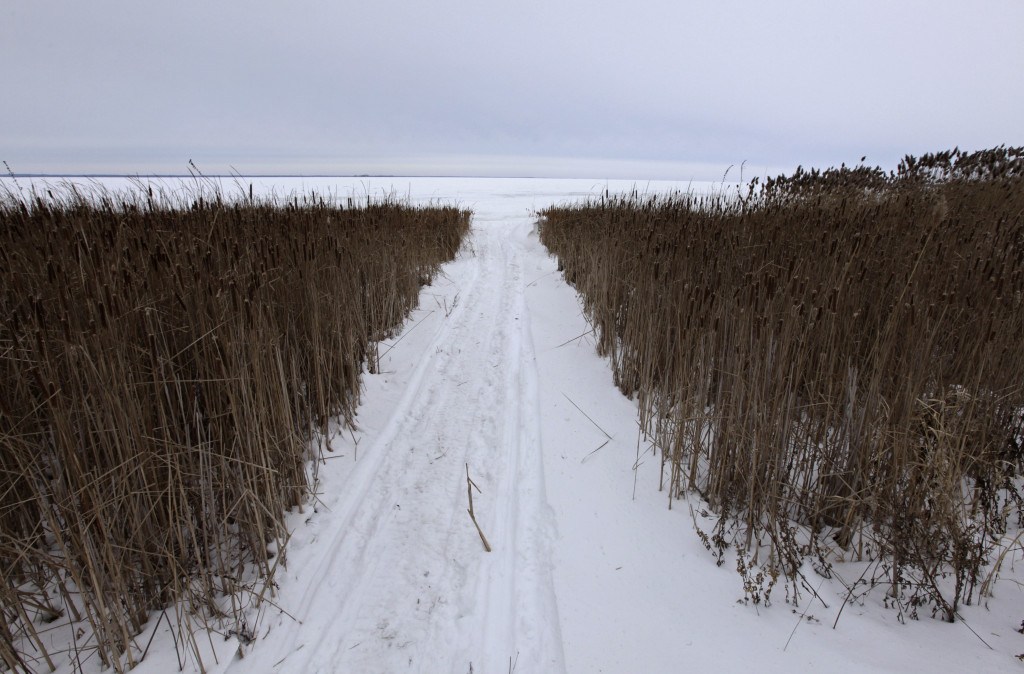Freezing weather across the U.S. will damage crops from winter wheat to oranges and is threatening livestock, sending cattle futures to an all-time high.
As much as 15 percent of winter-wheat plants in the Great Plains face damage, Kyle Tapley, a senior agricultural meteorologist at MDA Weather Services in Gaithersburg, Maryland, said in a telephone interview. The potential for frost will increase in Florida tonight and tomorrow as temperatures drop to the upper 20s Fahrenheit, damaging citrus groves, he said. Livestock slaughter will slow because it’s harder to transport animals in the cold and snow, and cattle will have trouble gaining weight, according to commodity broker Allendale Inc.
The coldest air in almost 20 years is sweeping over the central U.S. toward the East Coast, threatening to topple temperature records and ignite energy demand. Hard-freeze warnings and watches, which are alerts for farmers, stretch from Texas to central Florida, and 90 percent of the contiguous U.S. will be at or below the freezing mark today, according to the U.S. Weather Prediction Center in College Park, Maryland. Wheat futures headed for the biggest two-session gain in more than a month.
“There’s some concern over what the cold can do to damage the crops,” Jack Scoville, the vice president of Price Futures Group, said in a telephone interview from Chicago. “Extreme cold has made logistics a huge problem, and there’s some risk in loss of production in both wheat and oranges. The cows and hogs are going to need a whole lot of feed to keep warm.”
Cattle Record
The Standard & Poor’s GSCI Agriculture Index of eight crops gained 0.4 percent to 351.47 at 11:26 a.m. in New York. The S&P gauge of 24 commodities was little changed. Cattle futures reached $1.368 a pound, the highest since Chicago trading began in 1964.
Wheat futures on the Chicago Board of Trade are up 1.9 percent since Jan. 2, heading for the biggest two-session gain since Nov. 29. Prices climbed as much as 1.2 percent today.
“The market is rising on speculation we will see some yield losses that will tighten up U.S. supplies,” Chad Henderson, the president of Prime Agricultural Consultants Inc. in Brookfield, Wisconsin, said in a telephone interview. “We haven’t seen these types of temperatures in 20 years, and the market is uncertain of the eventual impact on yields.”
Snow Cover
Most wheat in the southern Great Plains and Midwest has about 1 inch (2.5 centimeters) of snow cover that can help to protect the dormant crops, Tapley of MDA said. About 62 percent of the plants were in good or excellent condition at the end of November, according to the U.S. Department of Agriculture.
Cattle prices climbed 1.8 percent in 2013, the fifth straight annual gain and the longest rally since 1964. Beef output in the U.S., the world’s biggest producer, may slump 5.7 percent this year to the lowest since 1993, the USDA has projected.
Animals will need to use more energy to stay warm in cold weather, reducing weight increases and potentially limiting beef supplies, Rich Nelson, chief strategist at Allendale in McHenry, Illinois, said in a telephone interview. Livestock slaughter will also slow, he said.
“The sort of weather is always an issue for livestock,” Sterling Smith, a futures specialist at Citigroup Inc. in Chicago, said in a telephone interview. “You can’t move hogs in weather like this. They will freeze.”
Citrus Groves
Frost may hurt as much as 15 percent of citrus plants in Florida, the world’s biggest producer after Brazil, MDA’s Tapley forecasts. Orange-juice futures in New York jumped 19 percent in 2013 as a crop disease threatened U.S. production. For there to be “material” damage to groves, the temperature will need to stay below 28 degrees Fahrenheit (-2.2 Celsius) for four hours, Citigroup’s Smith said.
“If you only touch 28 degrees and move back up in the 30s relatively quickly, the amount of damage is going to be comparatively limited,” Smith said. “There is the potential for damage, because cold weather is not necessarily easy to predict.”
–Editors: Millie Munshi, Patrick McKiernan
Was this article valuable?
Here are more articles you may enjoy.


 Why 2026 Is The Tipping Point for The Evolving Role of AI in Law and Claims
Why 2026 Is The Tipping Point for The Evolving Role of AI in Law and Claims  LA County Told to Pause $4B in Abuse Payouts as DA Probes Fraud Claims
LA County Told to Pause $4B in Abuse Payouts as DA Probes Fraud Claims  Uber Jury Awards $8.5 Million Damages in Sexual Assault Case
Uber Jury Awards $8.5 Million Damages in Sexual Assault Case  Tesla Sued Over Crash That Trapped, Killed Massachusetts Driver
Tesla Sued Over Crash That Trapped, Killed Massachusetts Driver 